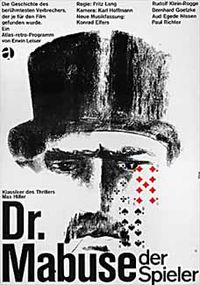|
 "Your
conclusion was his scheme." -- Mouse and the Traps "Your
conclusion was his scheme." -- Mouse and the Traps
Most successful poker players are great manipulators. When opponents act on their hands, if they are confused, you have failed as
player. Poker perfection would be if every time an opponent acted, you could simply tell them what to do, and they would do it. In
Fritz Langís classic silent film Dr. Mabuse, The Gambler,
Mabuse used some heebie-jeebie mind-control to get his opponents to do what he wanted them to do -- like folding a winning hand,
or standing pat on three in blackjack.
Of course, this level of complete brainwashing is not possible in real life. However, the height of
successful play is for opponents to choose to do exactly as you want them to do
-- the conclusions they draw are the result of your ďschemes.Ē This is not easy, and most of the time you will not be able to absolutely convince your
opponent that doing the wrong thing is the right thing to do, so in many cases having confused opponents will be the next best thing. (Having opponents
who are sure they are doing the right thing when they in fact are doing the right thing is the worst possibility.) Still, when our opponents are confused,
we should view this as a failure.
So since we canít completely brainwash our opponents the majority of the time does that mean we fail as players most of the time? Yes,
and no. Because poker normally has a very limited amount of options available (bet, call, raise, fold), it creates an illusion that
the game is really simple. Actually, poker is simple... itís winning poker that is complex, and top-flight poker is tremendously challenging.
Because of the Internet, a large number of new players begin to play poker regularly (both casino poker and online poker). Even though a lot
of them donít think of themselves this way, what we get is a huge influx of novices into
the poker ecosystem.
Imagine if the next time you got on the freeway you found yourself surrounded by hundreds of sixteen year-old student drivers. Boy,
that would be different. For the most part (with major exceptions) these student drivers would be more timid, more conscientious, and
more careful than the drivers you normally share the freeway with. Now imagine being a student driver in this sea of student drivers!
Learning to drive on a road full of people who donít know how to drive is going to make the learning even more challenging.
Beating poker is not hard if you try hard, but it is very hard if you don't try hard. Studying, analyzing, discussing and genuinely
honest self-appraisal leads to the creation of winning poker players. While bellyaching or just giving up is easier, it doesn't help
you improve. Newbie players need to understand that while poker may look easy, it really isnít. You must work hard to do well.
And that hard work never ends. Even the toughest, most experienced players can look back on
sessions and recall hands where they didnít
manipulate their opponents to act as they wanted them to. The challenges never end. The toughest, strongest players reading this could
just go out and play on autopilot and do just fine, but they will be nowhere near their own potential.
Since we can make friends and have peers to share our poker lives with, a poker education is not a completely solitary thing. Others
can help, but getting better as a player is mostly a result of self-motivation. No one, including me here, can tell you everything you
need to do to get better as a player, but I can tell you that you must constantly do something. If you think you are ďdoneĒ
learning, you are an idiot. You arenít ďdoneĒ till
that day when you can control every opponent like Dr. Mabuse did. (On the other hand, Dr. Mabuse ended up catatonic in a lunatic asylum...)
Every poker player can improve. The challenges facing experienced players are different than the challenges facing newbies, but the
common element is that to get over the hurdles each face, hard work is required, both at the table and away from it. If you don't want
to work hard, you donít want to win.
See Controlling Opponents not
Confusing them and
Playing the Other Man's Game |

